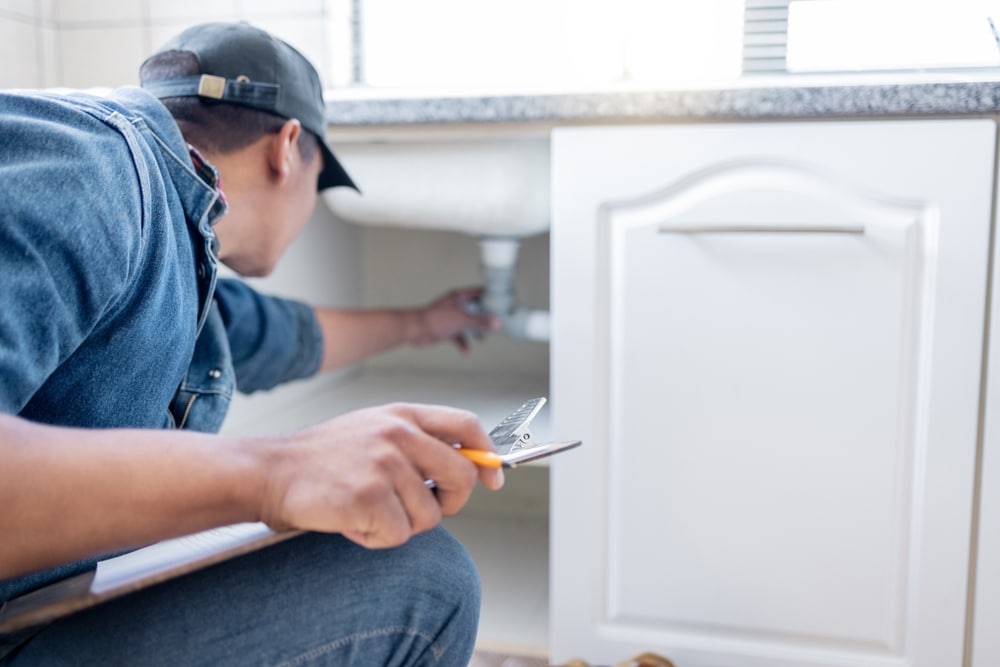
Homeowners often face a variety of plumbing issues, from minor leaks and clogged drains to major pipe bursts and water heater malfunctions. These problems can disrupt daily life and lead to costly repairs if not addressed promptly. To avoid such inconveniences and ensure the smooth operation of your plumbing system, an annual plumbing check-up is vital. Regular plumbing inspections help prevent major failures, save money on repairs, and maintain the efficiency of your plumbing system. So, learn all about what an annual plumbing maintenance appointment entails and start taking care of your home’s most precious system.
What Is an Annual Plumbing Check-Up?
An annual plumbing check-up is exactly how it sounds — it’s a comprehensive inspection conducted by professional plumbers to assess the health of your plumbing system. This yearly plumbing maintenance involves a detailed examination of various components to identify potential issues before they become serious problems.
Key components typically inspected during an annual plumbing inspection include:
-
Pipes
-
Faucets and Fixtures
-
Water Heater
-
Drainage Pipes
-
Toilets
-
Appliances
-
Sump Pumps and Sewer Lines
Benefits of Regular Plumbing Maintenance
Are you wondering why we’re putting so much emphasis on the importance of annual plumbing inspections? The answer is simple: because it’s good for your plumbing’s health! If you want to get further into the specifics, check out the benefits of having your plumbing routinely maintained:
Prevention of Major Plumbing Failures
Many plumbing problems lurk beneath the surface — some even quite literally (think: slab leaks). For this reason, routine plumbing inspections are essential because they help identify minor issues before they escalate into significant problems. Early detection can save you from the hassle of dealing with extensive damage to your home.
Cost Savings
When you can catch problems early, you can keep your bank account well-padded (and keep funds for more fun home improvement projects, like kitchen renovation). Regular plumbing maintenance saves you money by reducing the need for emergency repairs, which are often extensive and intricate.
Increased Lifespan of Plumbing Systems
Consistent maintenance also extends the life of your plumbing system. Well-maintained pipes, fixtures, and appliances operate efficiently for longer, delaying the need for replacements.
Improved Water Quality and Pressure
Annual plumbing inspections ensure that your water supply is clean and free from contaminants. They also help maintain optimal water pressure, enhancing your overall water usage experience.
Environmental Benefits
Well-maintained plumbing systems are more efficient, using less water and reducing waste. This not only benefits the environment but also lowers your water bills.
What Happens During a Yearly Plumbing Maintenance Appointment?
A thorough home plumbing inspection checklist includes several critical steps:
- Visual Inspections of Pipes and Fixtures: Professional plumbers examine visible pipes and fixtures for signs of leaks, corrosion, or damage.
- Testing Water Pressure and Checking for Leaks: Water pressure is tested to ensure it is within the optimal range. Plumbers also check for hidden leaks that could lead to water damage and higher water bills.
- Inspecting Water Heaters and Appliances: Water heaters, dishwashers, and washing machines are inspected for efficiency and potential issues, ensuring they operate smoothly.
- Drain Cleaning and Inspection: Drains are cleaned and inspected for blockages and to ensure proper drainage and prevent clogs.
- Assessment of Sump Pumps and Sewer Lines: Sump pumps and sewer lines are checked for functionality and blockages to make sure they effectively protect your home from water damage.
When to Schedule Your Plumbing Check-Up
Timing your annual plumbing check-up strategically can make a significant difference in the longevity and efficiency of your plumbing system. Ideally, you should schedule your yearly inspection either before winter or during the spring. By scheduling an inspection before winter, you can ensure your pipes and water heater are prepared for colder temperatures — after all, freezing temperatures can cause pipes to burst, leading to costly repairs and water damage. A thorough inspection will identify and address vulnerabilities in your system to prevent costly disasters at the worst times.
Spring is also an excellent time for a plumbing check-up. After the stress of winter, your plumbing system might have endured freezing and thawing cycles, which can cause wear and tear. A spring inspection can identify any damage that occurred during winter, allowing for timely repairs before the demands of summer water usage begin. Our plumbing experts can help you determine the best time to have your system inspected.
Signs It’s Time for an Inspection
While winter and spring are ideal times for a plumbing check-up, there are instances when an inspection is a must, no matter the time of year. Call a professional plumber for an inspection if:
- There are unusual noises coming from your plumbing system.
- You’ve been dealing with slow drainage or frequent clogs.
- You’ve noticed a sudden spike in your water bills.
- Your water pressure has decreased.
- There are visible leaks or water damage.
Choosing the Right Plumber for the Job
Do you need to hire a plumber for your annual plumbing inspection? To find the right plumber, make sure you keep these factors in mind:
Credentials and Experience
Choose a plumber with the necessary licenses and certifications. Experience in handling various plumbing issues is also crucial for reliable service.
Reviews and Recommendations
Check online reviews and ask for recommendations from friends and family. Positive feedback from previous clients indicates trustworthy service.
Services Offered and Area of Specialization
Ensure the plumber offers comprehensive services, including plumbing repairs and maintenance. Specialization in residential plumbing is a plus.
DIY Tips for Year-Round Plumbing Health
Between your professional appointments, you should perform a few tasks to keep your plumbing in optimal condition. To make things easier, we’ve compiled the perfect residential plumbing inspection checklist for you to follow:
- Regularly check for leaks under sinks and around fixtures.
- Clean out drains with baking soda and vinegar to prevent clogs and odors.
- Insulate exposed pipes to protect them from freezing in winter.
- Flush the water heater to remove sediment buildup.
- Test the water pressure regularly.
Stay Proactive Against Problems With TKO Plumbing Services
So, remember, regular plumbing inspections can save you time, money, and stress by preventing major plumbing issues and maintaining the efficiency of your plumbing system. If you need help with your system’s maintenance and want to receive reliable and professional plumbing check-ups, contact TKO Plumbing Services. We offer comprehensive annual plumbing inspections tailored to keep your home’s plumbing in top condition year-round. Get started today!







